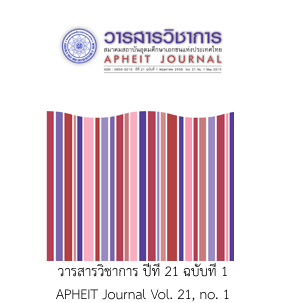MARKETING INTEGRATION STRATEGY AND SUSTAINED COMPETITIVE ADVANTAGE: AN EMPIRICAL INVESTIGATION OF ANTECEDENTS AND CONSEQUENCES IN THE EXPORTING FIRMS FROM GEMS AND JEWELRY BUSINESSES IN THAILAND
Main Article Content
Abstract
This study examined the influence two dimensional of marketing integration strategy (MIS) on sustained competitive advantage via mediating effects of marketing collaboration efficiency, product innovation capability, and marketing responsiveness. Moreover, two antecedent constructs were comprised of modern marketing vision and business network through moderating effect on marketing experience. Here, 219 gems and jewelry exporting businesses in Thailand were chosen as the sample. This paper reported that both dimensions of MIS had a significant impact on marketing collaboration efficiency and product innovation capability. Likewise, marketing collaboration efficiency and product innovation capability had a potential positive influence on marketing responsiveness leading to sustained competitive advantage. Additionally, the two factor antecedents had a significant positive effect on each dimension of MIS as expected while only the modern marketing vision had no significant effect on dynamic learning orientation. The findings indicated that the marketing experience did not moderate the relationships among antecedents and MIS. Accordingly, the potential discussion with the results is implemented in the study. Theoretical and managerial contributions were explicitly provided. Conclusion, suggestions and directions of the future research were also highlighted.

